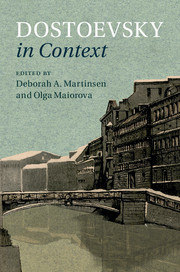Book contents
- Frontmatter
- Contents
- List of illustrations
- Notes on contributors
- Acknowledgments
- Note on citation, transliteration, glossary, and dates
- Chronology
- 1 Introduction: the many worlds of Dostoevsky
- PART I SOCIAL, HISTORICAL, AND CULTURAL CONTEXTS
- i CHANGING POLITICAL, ECONOMIC, AND SOCIAL LANDSCAPE
- ii POLITICAL, SOCIAL, AND CULTURAL INSTITUTIONS
- 9 Russian monarchy and the people
- 10 Empire
- 11 Service ranks
- 12 Education
- 13 Science, technology, and medicine
- 14 Jews, race, and biology
- 15 Suicide
- 16 Children
- 17 Gambling
- iii SPACE AND PLACE
- iv RELIGION AND MODERNITY
- PART II LITERATURE, JOURNALISM, AND LANGUAGES
- Glossary
- Further reading
- Index
- References
16 - Children
from ii - POLITICAL, SOCIAL, AND CULTURAL INSTITUTIONS
Published online by Cambridge University Press: 18 December 2015
- Frontmatter
- Contents
- List of illustrations
- Notes on contributors
- Acknowledgments
- Note on citation, transliteration, glossary, and dates
- Chronology
- 1 Introduction: the many worlds of Dostoevsky
- PART I SOCIAL, HISTORICAL, AND CULTURAL CONTEXTS
- i CHANGING POLITICAL, ECONOMIC, AND SOCIAL LANDSCAPE
- ii POLITICAL, SOCIAL, AND CULTURAL INSTITUTIONS
- 9 Russian monarchy and the people
- 10 Empire
- 11 Service ranks
- 12 Education
- 13 Science, technology, and medicine
- 14 Jews, race, and biology
- 15 Suicide
- 16 Children
- 17 Gambling
- iii SPACE AND PLACE
- iv RELIGION AND MODERNITY
- PART II LITERATURE, JOURNALISM, AND LANGUAGES
- Glossary
- Further reading
- Index
- References
Summary
The idea of childhood is a relatively recent phenomenon brought to center stage by writers and artists of the eighteenth and nineteenth centuries. During that period, children figured widely in the works of American, European, and Russian writers, and the production of literature for children burgeoned. Amid this new focus on children and childhood, Dostoevsky nevertheless emerges as a special, even an extreme case. Children and the suffering and death of children loom large throughout Dostoevsky's work and life.
Children form the bedrock of Dostoevsky's oeuvre and are as essential to his writing as his dialogic worldview. His fiction and journalism not only portray children's moral complexity and the need for social reform to improve their lives, but also his writerly awareness of children's usefulness in keeping a reader's interest alive. They figure at the heart of his work and in the questions with which he struggled throughout his life. Moreover, the deaths of two of his children – the infant Sonya (1868) and the toddler Alexei (1878) – hover behind The Idiot (1868) and The Brothers Karamazov (1879–80), suffusing them with wrenching emotion and informing the complex moral and religious questions these novels pose and attempt to answer. Like Dickens and Tolstoy, two other nineteenth-century writers for whom children were unceasingly important – in their fiction, journalism, and writings about education – Dostoevsky had a difficult, fraught relation with his own father and was, perhaps, not an ideal father himself.
Dostoevsky's biography inevitably raises unanswerable questions. He spent his childhood living in the grounds of the Mariinsky Hospital for the Poor where his father was a physician. Was 9-year-old Fedya asked to fetch his father to treat a little girl who had been raped? Were the hospital gardens where he played peopled by destitute children, the very ill, the insane, and even criminals? Did he interact with them? Was Dostoevsky's father murdered by his serfs, or did he die of an apoplectic fit? When did Dostoevsky's first epileptic seizure occur? Yet Dostoevsky had happy moments that counterbalanced his darker childhood experiences: from an early age, his mother, nanny, and even his severe father read him stories and told him tales that constituted cherished memories for him.
- Type
- Chapter
- Information
- Dostoevsky in Context , pp. 139 - 147Publisher: Cambridge University PressPrint publication year: 2016



